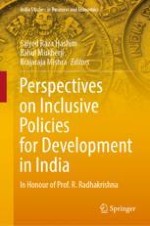2022 | OriginalPaper | Buchkapitel
‘Khadi’ Under the Neoliberal Economic Dispensation: Relevance and Issues
verfasst von : Amita Shah
Erschienen in: Perspectives on Inclusive Policies for Development in India
Verlag: Springer Nature Singapore
Aktivieren Sie unsere intelligente Suche, um passende Fachinhalte oder Patente zu finden.
Wählen Sie Textabschnitte aus um mit Künstlicher Intelligenz passenden Patente zu finden. powered by
Markieren Sie Textabschnitte, um KI-gestützt weitere passende Inhalte zu finden. powered by
